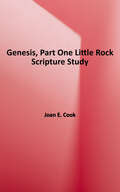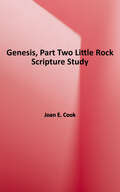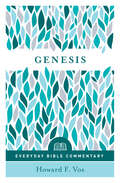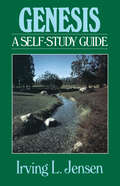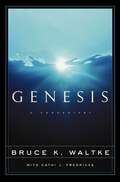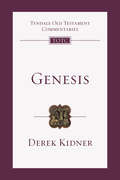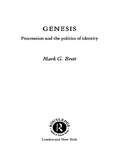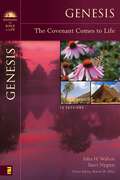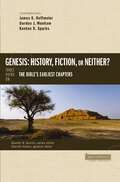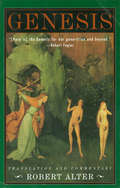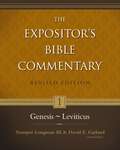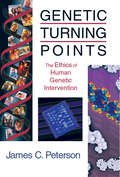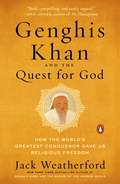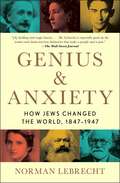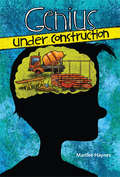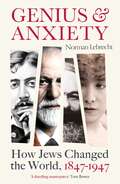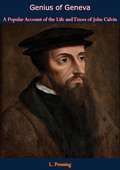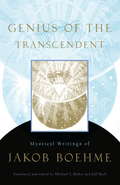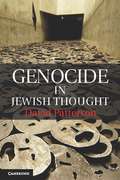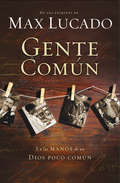- Table View
- List View
Genesis, Part One (Little Rock Scripture Study)
by Joan E. CookA study of the book of Genesis is an invitation not only to contemplate the creation story but to remember with the Israelites their ancestors in faith. Part One of this study covers Genesis 1:1-25:18 (the “pre-history” of Israel including the creation accounts, the stories of the fall and the great flood, as well as the story of Abraham and Sarah). Commentary, study and reflection questions, prayer, and access to recorded lectures are included. 5 sessions.
Genesis, Part Two (Little Rock Scripture Study)
by Joan E. CookA study of the book of Genesis moves the reader from the cosmic creation story to the story of the creation of God’s people. Part Two of this study moves us forward from the time of Abraham to the unfolding of his family in the stories of Isaac and Jacob, as well as the story of Joseph and his brothers and their clans. Commentary, study and reflection questions, prayer, and access to recorded lectures are included. 5 sessions.
Genesis- Everyday Bible Commentary (Everyday Bible Commentary)
by Howard F. VosFrom Adam and Eve through to the patriarchs, the Bible is telling us who God is, who we are, and how we got into the place we&’re in now. But it keeps going, it tells us what God has done and is doing to redeem us. The stories of Genesis come to life when someone explains the significance of all the little details we so often skip over. This is exactly what the best preachers do, but you don&’t have to wait until Sunday&’s sermon. Encounter the beautiful depth of Genesis through an enlightening verse-by-verse commentary from Howard Vos that&’s both straightforward and insightful. You&’ll gain:Important historical and cultural backgroundInsightful comments on the stories of GenesisHelp with the difficult passages And more!You don&’t have to go to seminary to encounter God in exciting, new ways through His Word. Discover how much more enjoyable your personal study will be with understandable, quality Bible commentary for everyday life.
Genesis- Everyday Bible Commentary (Everyday Bible Commentary)
by Howard F. VosFrom Adam and Eve through to the patriarchs, the Bible is telling us who God is, who we are, and how we got into the place we&’re in now. But it keeps going, it tells us what God has done and is doing to redeem us. The stories of Genesis come to life when someone explains the significance of all the little details we so often skip over. This is exactly what the best preachers do, but you don&’t have to wait until Sunday&’s sermon. Encounter the beautiful depth of Genesis through an enlightening verse-by-verse commentary from Howard Vos that&’s both straightforward and insightful. You&’ll gain:Important historical and cultural backgroundInsightful comments on the stories of GenesisHelp with the difficult passages And more!You don&’t have to go to seminary to encounter God in exciting, new ways through His Word. Discover how much more enjoyable your personal study will be with understandable, quality Bible commentary for everyday life.
Genesis- Jensen Bible Self Study Guide (Jensen Bible Self-Study Guide Series)
by Irving L. JensenGenesis is the book of beginnings. In it we have the account of the creation of the universe and all that is within it. In the book of Genesis we see God putting into action the plan He has had eternally for mankind. This self-study guide will help you as you study, through fortune organized lessons, each facet of God's program. Charts, maps, and diagrams appear throughout the study guide and will give you a greater understanding of this unique, foundational book of beginnings.The books in the Jensen Bible Self-Study Guide series are designed to provide you with a broader understanding of God&’s Word. Offering historical context and background, author information, charts, and other helps, these books will equip you with a comprehensive reference tool you&’ll return to often. Each study includes an opportunity for analysis, response, and further study in a response-oriented format. The thirty-nine books in this series are suitable for both personal and group use.
Genesis- Jensen Bible Self Study Guide (Jensen Bible Self-Study Guide Series)
by Irving L. JensenGenesis is the book of beginnings. In it we have the account of the creation of the universe and all that is within it. In the book of Genesis we see God putting into action the plan He has had eternally for mankind. This self-study guide will help you as you study, through fortune organized lessons, each facet of God's program. Charts, maps, and diagrams appear throughout the study guide and will give you a greater understanding of this unique, foundational book of beginnings.The books in the Jensen Bible Self-Study Guide series are designed to provide you with a broader understanding of God&’s Word. Offering historical context and background, author information, charts, and other helps, these books will equip you with a comprehensive reference tool you&’ll return to often. Each study includes an opportunity for analysis, response, and further study in a response-oriented format. The thirty-nine books in this series are suitable for both personal and group use.
Genesis: A Commentary
by Bruce K. Waltke Cathi J. FredricksThis landmark commentary marshals the vast experience and brilliant insights of one of today’s most revered Old Testament scholars. To those familiar with the work of Bruce K. Waltke, the significance and value of Genesis will be instantly apparent. Others who are unfamiliar with Waltke have only to read the first few chapters to understand why he has earned the reputation of a scholar’s scholar, and why this masterful volume stands like a monolith among Old Testament commentaries. Exploring the first book of the Bible as "theological literature," Waltke illuminates its meanings and methods for the pastor, scholar, teacher, student, and Bible-lover. Genesis strikes an unusual balance by emphasizing the theology of the Scripture text while also paying particular attention to the flow and development of the plot and literary techniques--inclusion, irony, chiasm, and concentric patterning--that shape the message of the "book of beginnings". Genesis Models the way to read and interpret the narratives of the book of Genesis Provides helpful exegetical notes that address key issues and debates surrounding the text Includes theological reflections on how the message addresses our contemporary theological and social issues, such as ecology, homosexuality, temperance, evil, prayer, and obedience Addresses critical interpretive issues, such as authenticity, date, and authorship For all the author’s formidable intellect and meticulous research, Genesis is amazingly accessible. This is no mere study tool. Lucidly and eloquently written, it is a work of the heart that helps us not only to understand deeply God’s Word in its context, but also to consider how it applies to us today.
Genesis: An Introduction And Commentary (Tyndale Old Testament Commentaries #Volume 1)
by Derek KidnerGenesis--the Bible's account of human origins and the harbinger of human destiny--is a book teeming with critical problems. Who wrote it? When? Does the account of creation square with modern science? What about Adam and Eve? Derek Kidner not only provides a running exegetical commentary, but lucidly handles the tough issues that Genesis raises. His clear prose and theological insight will expand readers' understanding of God's character and of human nature and destiny. The Tyndale Old Testament Commentaries have long been a trusted resource for Bible study. The introduction to each volume gives a concise but thorough description of the authorship, date and historical background of the biblical book under consideration. The commentary itself examines the text section by section, drawing out its main themes. It also comments on individual verses and deals with problems of interpretation. Written by some of the world's most distinguished evangelical scholars, these volumes retain their original text now retypeset in a larger format. As always, they continue to aim at the true meaning of the Bible and to make its message plain to readers today. The original, unrevised text of this volume has been completely retypeset and printed in a larger, more attractive format with the new cover design for the series.
Genesis: Procreation and the Politics of Identity
by Mark G. BrettCombining insights from social and literary theory as well as traditional historical studies, Mark Brett argues that the first book of the Bible can be read as resistance literature.Placing the theological text firmly within its socio-political context, he shows that the editors of Genesis were directly engaged with contemporary issues, especially the nature of an authentic community, and that the book was designed to undermine the ethnocentism of the imperial governors of the Persian period (fifth century BCE).
Genesis: Seventh-Day Adventist
by Jacques B. DoukhanThe book of Genesis has been called “the most important book ever written.” As the first book of the Bible, it not only contains or anticipates all the biblical truths, it is also the book that, more than any other biblical book, has impacted the whole of Scripture, and theology at large. Without the book of Genesis, the Bible would be incomprehensible. According to author Jacques Doukhan, DHL, ThD, “The book of Genesis is…the ideal place to start our study, not only because it will help us understand our origins and destination, but also because it teaches us how to engage with and reach out to others. In the process we will be surprised by a God of love and mercy, whose first revelation is reported in the book of Genesis.”
Genesis: The Covenant Comes to Life (Bringing the Bible to Life)
by John H. Walton Janet NygrenA series of Bible study guides following the format and content of the NIV Application Commentaries Series. Each study looks at the original meaning, bridging contexts, and contemporary significance of the text, and offers small group participants a better understanding and relevant application of the biblical material to their daily lives.
Genesis: Three Views on the Bible’s Earliest Chapters (Counterpoints: Bible and Theology)
by Stanley N. Gundry Charles Halton Gordon John Wenham James K. Hoffmeier Kenton SparksThere is little doubt that in recent years the nature of the Genesis narrative has sparked much debate among Christians. This Counterpoints volume introduces three predominant interpretive genres and their implications for biblical understanding. Each contributor identifies their position on the genre of Genesis 1-11, addressing why it is appropriate to the text, and contributes examples of its application to a variety of passages. The contributors and views include: James K. Hoffmeier: Theological History Gordon J. Wenham: Proto-History Kenton K. Sparks: Ancient Historiography General editor and Old Testament scholar Charles Halton explains the importance of genre and provides historical insight in the introduction and helpful summaries of each position in the conclusion. In the reader-friendly Counterpoints format, this book helps readers to reflect on the strengths and weaknesses of each view and draw informed conclusions in this much-debated topic.
Genesis: Translation And Commentary
by Robert Alter"[Here is] the Genesis for our generation and beyond."—Robert Fagles Genesis begins with the making of heaven and earth and all life, and ends with the image of a mummy—Joseph's—in a coffin. In between come many of the primal stories in Western culture: Adam and Eve's expulsion from the garden of Eden, Cain's murder of Abel, Noah and the Flood, the destruction of Sodom and Gomorrah, Abraham's binding of Isaac, the covenant of God and Abraham, Isaac's blessing of Jacob in place of Esau, the saga of Joseph and his brothers. In Robert Alter's brilliant translation, these stories cohere in a powerful narrative of the tortuous relations between fathers and sons, husbands and wives, eldest and younger brothers, God and his chosen people, the people of Israel and their neighbors. Alter's translation honors the meanings and literary strategies of the ancient Hebrew and conveys them in fluent English prose. It recovers a Genesis with the continuity of theme and motif of a wholly conceived and fully realized book. His insightful, fully informed commentary illuminates the book in all its dimensions.
Genesis–Leviticus (The Expositor's Bible Commentary)
by ZondervanContinuing a Gold Medallion Award-winning legacy, the completely revised Expositor's Bible Commentary puts world-class biblical scholarship in your hands.A staple for students, teachers, and pastors worldwide, The Expositor's Bible Commentary (EBC) offers comprehensive yet succinct commentary from scholars committed to the authority of the Holy Scriptures. The EBC uses the New International Version of the Bible, but the contributors work from the original Hebrew and Greek languages and refer to other translations when useful.Each section of the commentary includes:An introduction: background information, a short bibliography, and an outlineAn overview of Scripture to illuminate the big pictureThe complete NIV textExtensive commentaryNotes on textual questions, key words, and conceptsReflections to give expanded thoughts on important issuesThe series features 56 contributors, who:Believe in the divine inspiration, complete trustworthiness, and full authority of the BibleHave demonstrated proficiency in the biblical book that is their specialtyAre committed to the church and the pastoral dimension of biblical interpretationRepresent geographical and denominational diversityUse a balanced and respectful approach toward marked differences of opinionWrite from an evangelical viewpointFor insightful exposition, thoughtful discussion, and ease of use—look no further than The Expositor's Bible Commentary.
Genetic Turning Points: The Ethics of Human Genetic Intervention (Critical Issues in Bioethics (CIB))
by James C. PetersonThis timely volume clearly lays out the central ethical questions raised by today's rapid advances in biotechnology. James Peterson sorts through the maze of clinical decisions occasioned by human genetic intervention, organizing the range of moral considerations that now face us and exploring their practical impact on individuals, families, and communities. / The ethical question are covered in the order of how soon the particular technologies that raise them are becoming available. This unique format allows readers to go directly to issues of particular interest. Peterson assumes no prior knowledge of genetics or ethics, making his work one of the most accessible discussions of bioethics available today.
Genghis Khan and the Quest for God: How the World's Greatest Conqueror Gave Us Religious Freedom
by Jack WeatherfordA landmark biography by the New York Times bestselling author of Genghis Khan and the Making of the Modern World that reveals how Genghis harnessed the power of religion to rule the largest empire the world has ever known. Throughout history the world's greatest conquerors have made their mark not just on the battlefield, but in the societies they have transformed. Genghis Khan conquered by arms and bravery, but he ruled by commerce and religion. He created the world's greatest trading network and drastically lowered taxes for merchants, but he knew that if his empire was going to last, he would need something stronger and more binding than trade. He needed religion. And so, unlike the Christian, Taoist and Muslim conquerors who came before him, he gave his subjects freedom of religion. Genghis lived in the 13th century, but he struggled with many of the same problems we face today: How should one balance religious freedom with the need to reign in fanatics? Can one compel rival religions - driven by deep seated hatred--to live together in peace? A celebrated anthropologist whose bestselling Genghis Khan and the Making of the Modern World radically transformed our understanding of the Mongols and their legacy, Jack Weatherford has spent eighteen years exploring areas of Mongolia closed until the fall of the Soviet Union and researching The Secret History of the Mongols, an astonishing document written in code that was only recently discovered. He pored through archives and found groundbreaking evidence of Genghis's influence on the founding fathers and his essential impact on Thomas Jefferson. Genghis Khan and the Quest for God is a masterpiece of erudition and insight, his most personal and resonant work.From the Hardcover edition.
Genius & Anxiety: How Jews Changed the World, 1847-1947
by Norman LebrechtA unique chronicle of the years 1847-1947, the century when the Jewish people changed the world—and it changed them.In a hundred-year period, a handful of men and women changed the way we see the world. Many of them are well known—Marx, Freud, Proust, Einstein, Kafka. Others have vanished from collective memory despite their enduring importance in our daily lives. Without Karl Landsteiner, for instance, there would be no blood transfusions or major surgery. Without Paul Ehrlich, no chemotherapy. Without Siegfried Marcus, no motor car. Without Rosalind Franklin, genetic science would look very different. Without Fritz Haber, there would not be enough food to sustain life on earth. What do these visionaries have in common? They all had Jewish origins. They all had a gift for thinking in wholly original, even earth-shattering ways. In 1847 the Jewish people made up less than 0.25% of the world&’s population, and yet they saw what others could not. How? Why? Norman Lebrecht has devoted half of his life to pondering and researching the mindset of the Jewish intellectuals, writers, scientists, and thinkers who turned the tides of history and shaped the world today as we know it. In Genius & Anxiety, Lebrecht begins with the Communist Manifesto in 1847 and ends in 1947, when Israel was founded. This robust, magnificent volume, beautifully designed, is an urgent and necessary celebration of Jewish genius and contribution.
Genius Under Construction
by Marilee HaynesGabe--St. Jude's resident genius--is back for his final year of middle school. As an eighth grader, he must fulfill a community service requirement and decide if he will attend a high school for science and math.
Genius and Anxiety: How Jews Changed the World, 1847–1947
by Norman LebrechtMarx, Freud, Proust, Einstein, Bernhardt and Kafka. Between the middle of the nineteenth and twentieth centuries a few dozen men and women changed the way we see the world. But many have vanished from our collective memory despite their enduring importance in our daily lives. Without Karl Landsteiner, for instance, there would be no blood transfusions or major surgery. Without Paul Ehrlich no chemotherapy. Without Siegfried Marcus no motor car. Without Rosalind Franklin genetic science would look very different. Without Fritz Haber there would not be enough food to sustain life on earth. These visionaries all have something in common – their Jewish origins and a gift for thinking outside the box. In 1847 the Jewish people made up less than 0.25% of the world&’s population, and yet they saw what others could not. How?
Genius of Geneva: A Popular Account of the Life and Times of John Calvin
by L. PenningThe present volume is the English translation of the original Dutch language biography of John Calvin (July 10, 1509 - May 27, 1564), a French theologian, pastor and reformer in Geneva during the Protestant Reformation. Born Jehan Cauvin in Noyon, Picardy, France, Calvin was a principal figure in the development of the system of Christian theology later called Calvinism, aspects of which include the doctrines of predestination and of the absolute sovereignty of God in salvation of the human soul from death and eternal damnation, in which doctrines Calvin was influenced by and elaborated upon the Augustinian and other Christian traditions. Various Congregational, Reformed and Presbyterian churches, which look to Calvin as the chief expositor of their beliefs, have spread throughout the world.
Genius of the Transcendent: Mystical Writings of Jakob Boehme
by Jeff Bach Jakob Boehme Michael L. BirkelHere, for the spiritual adventurers of our own age, is an accessible introduction to one of the most important of the Christian mystical writers. Jakob Boehme (1575-1624) was a humble shoemaker of Görlitz in eastern Germany who, in response to the visionary experiences that began for him as a teenager, wrote a series of theosophical treatises that explore the nature of God and humanity. His ability to give words to the ineffable has never been surpassed, and his influence can be felt in the generations of mystics who followed him, as well as in Pietists, German Romantics, Quakers, and American utopianists, among many others. Five of Boehme's most essential works are presented here in fresh translations that demonstrate why Underhill called him "one of the most astonishing cases in history of a natural genius for the transcendent."
Gennie the Huguenot Woman
by Bette M. RossThe time of the French and Indian Wars. Those turbulent times when our nation was experiencing birth pains. Come now and take a step back into those tumultuous years with gennie, the Huguenot woman. You'll first meet this beautiful young French woman as she escapes with her mother from France after her father and brother are martyred for their Protestant faith. The two women reluctantly agree to journey to the New World as indentured servants to a French farmer in Pennsylvania. There Gennie meets and falls in love with Thomas Roebuck, a rugged young trapper who is headed North to fight against the French. Before he leaves, he and Gennie are betrothed. But while he is away, a wealthy, elderly merchant takes an interest in Gennie and offers her master a trade that is too tempting to resist. Gennie struggles to remain free but, as a servant, she is powerless to decide her own fate. She then finds herself involved in a cruel, loveless marriage and is sustained solely by her deep-rooted faith in her Savior. Despite her desperate situation, she believes that He will provide a means of escape.
Genocide in Jewish Thought
by David PattersonAmong the topics explored in this book are ways of viewing the soul, the relation between body and soul, environmentalist thought, the phenomenon of torture, and the philosophical and theological warrants for genocide. Presenting an analysis of abstract modes of thought that have contributed to genocide, the book argues that a Jewish model of concrete thinking may inform our understanding of the abstractions that can lead to genocide. Its aim is to draw upon distinctively Jewish categories of thought to demonstrate how the conceptual defacing of the other human being serves to promote the murder of peoples, and to suggest a way of thinking that might help prevent genocide.
Gente Común Perdidos y Hallados
by Max LucadoGente Común. Quizá escuchaste sus nombres en la Escuela Dominical durante la infancia. No siempre son los campeones o están en las ilustraciones del sermón. Tal vez no estuvieron al pie de la cruz ni fueron suspendidos en su propia cruz junto a Jesús, pero salpican las páginas de la Biblia, recordándonos que no estamos solos. Como tú y como yo, eran personas comunes y corrientes que cometían errores y afrontaban dificultades. Enfrentaron su propio pecado y se encontraron cara a cara con Dios, quien no solo limpia los pecados, sino que convierte aquello común y corriente en extraordinario. Descubrieron que todo cambia al encontrarse con el Dios viviente.Profundiza en la vida de más de veinte personajes bíblicos sumamente fascinantes, a través de una inspiradora selección de las obras del exitoso autor Max Lucado. Este tomo es el complemento ideal para el libro Gente Común. Incluye nuevos personajes y sus motivadoras historias.
Gente común
by Max LucadoAlgunas de las historias más poderosas de la Bibliacobrarán vida para los lectores de hoy mediante estas selecciones inspiradorasde los escritos de Max Lucado.Max proporciona una mirada irresistible a los momentos más impactantes de lanarrativa bíblica, tomada de sus escritos de más de veinte años. Al final decada capítulo se ofrecen preguntas para guiar el estudio mediante las cuales ellector puede profundizar en las Escrituras.Se narran historias extraordinarias de lossiguientes personajes: María, Pedro, Mateo, José, Nicodemo, la mujer samaritana,David, Ester, Job, Juan, el joven rico y otros.
